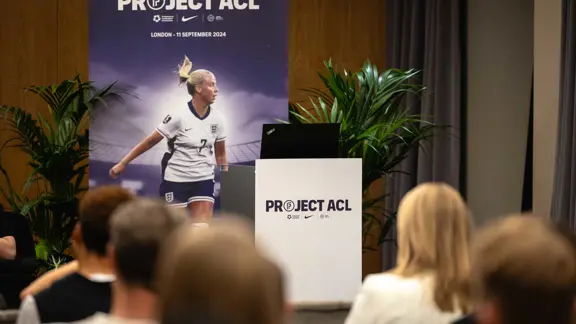News
Project ACL concludes first year of ground-breaking research

- The three-year project, led by FIFPRO, PFA England, Nike and Leeds Beckett University, is being piloted in England’s Women’s Super League
- Project ACL will continue research until 2027, focused on understanding the multifactorial risk factors for ACL injuries in professional footballers, with a view to increasing player availability
- ACL injuries are two to six times more likely to occur in women than men
In its first year Project ACL has laid solid foundations for exploring how the professional environment impacts the multifactorial risk factors for ACL injury and recovery in women’s football. Objectives of the study are to develop evidence-informed minimum standards and best-practice guidance on the working conditions in professional women's football.
ACL injuries are two to six times more likely to occur in women than men. Research suggests about two-thirds of ACL injuries occur in women’s football when there is no physical contact. Injuries are multifactorial, and most of the research to date has focused on the individual intrinsic characteristics of the player (i.e. biomechanics and physiology) rather than the training, competition and treatment environment of the players.
With most existing research and injury risk-reduction programmes focusing on non-professional players, there is also a need to understand some of the external environmental factors that may contribute to injury risk and recovery in professional women's football (i.e. working conditions such as provision of support within a club, resource availability).
Led by FIFPRO, the PFA, Nike and Leeds Beckett University, Project ACL is the first multistakeholder collaboration focused on mapping out the current training and competition environments, including the multidisciplinary support and players lived experiences within professional football clubs. This will allow us to highlight gold standard examples of best practice and identify modifiable and non-modifiable environmental factors that may contribute to injury risk.
The first-of-its-kind research has been co-designed by and for professional players to simultaneously develop minimum standards and best-practice guidance on working conditions in professional women's football.
The first year of Project ACL
Following the announcement of the three-year initiative in April 2024, and a subsequent media launch event in September 2024, Project ACL has helped stimulate significant progress:
- All 12 WSL clubs have completed the questionnaire and are participating in the project’s second phase, which includes interviews with multidisciplinary teams at all 12 clubs.
- Real-time tracking of player workload and travel has taken place via the FIFPRO Player Workload Monitoring Tool.
- An editorial review of existing literature has been published to support the research process.
The first year of the project has seen all 12 WSL clubs complete a questionnaire focused on best practice in injury risk-reduction, obtaining perceptions of the conditions at club level and return to play strategies.
The project has also reiterated a knowledge gap in ACL injury risk-reduction in professional women footballers, illustrating the need for further collaboration between scientists, clubs and players.
Dr Alex Culvin, FIFPRO’s Director of Global Policy & Strategic Relations for Women's Football, said: "This project is first and foremost about responding to the rightful calls from players for more research.
"As we have taken the initial steps towards that, I would like to extend our gratitude to all 12 WSL clubs for their willingness and participation in phase one of the research. It has been incredibly encouraging to see this. As the first research project to focus on environmental modifiable risk-factors potentially contributing to ACL injury, we are very pleased with the progress made so far."
The next phase of Project ACL will involve interviews with the multidisciplinary teams of all 12 WSL clubs and with the players themselves, whose voice is central to the initiative.
